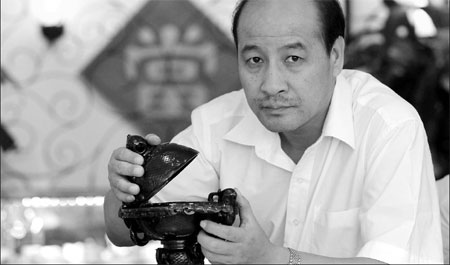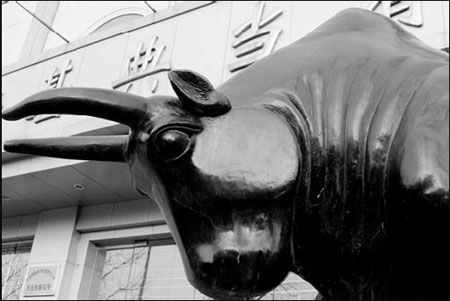Life and Leisure
Pawnshops spawn hot trade
By Pei Pei (China Daily)
Updated: 2010-10-21 07:50
 |
Large Medium Small |
|
Assistant pawnbroker Wang Shulin inspects an item at the Chongwenmen Branch of Beijing Huaxia Pawnshop Co Ltd. Zou Hong / China Daily |
|
A pawnshop in Beijing features a bull sculpture in front of the gate. Wu Changqing / For China Daily |
The hock business was banned in 1949 but has made a strong recovery over the past three decades to become a reputable industry. Pei Pei reports
Jade, gold and platinum jewelry, diamonds and brand name watches are just some of the luxury items that can be found in a Beijing pawnshop. The Chongwenmen Branch of Beijing Huaxia Pawnshop Co Ltd is a sign of the changing times, according to assistant pawnbroker Wang Shulin.
Professional geologists and jewelry specialists are hired to authenticate the quality of the items and price the jewelry, making pawnshops an ideal destination for consumers and jewelry collectors, Wang says.
About 30 years ago, it was totally different. Though pawnshops first appeared in China about 1,800 years ago, the business was abolished in 1949 because of what were perceived as deceptive practices. There were no pawnshops and the State-run stores offered a limited range of commodities.
Before the first pawnshop re-opened in the early 1990s, after reform and opening-up, Wang Shulin worked in other fields.
In 1979, the 20-year-old joined the China Imported Goods Collection Station of Beijing Trust Company, after working for two years in Beijing's countryside soon after graduation from high school.
"My excellent performance in the countryside got me the chance," Wang explains. It was an ideal job. His colleagues, who were older than Wang and professional second-hand dealers, could get fashionable imported products, which had not entered the Chinese market, such as color televisions, video recorders, ovens, Omega watches and cameras.
In those years, people returning from trips abroad often brought back such heavy, valuable products. Sometimes they already had a color TV, and no friends or relatives would pay high prices for them, then Wang's station became a place to turn the TV into cash.
Wang recalls how surprised he was the first time he saw a microwave oven heat steamed buns.
"It was amazing. A few minutes later, the cold bun became nice and warm as if fresh from the steamer. But there was no fire," recalls Wang, whose job was to evaluate these "exotic" products.
"We bought the products at a reasonable price, then we sold them at about 10 to 20 percent more than the purchase price," Wang says.
The microwave oven, for example, was priced at 1,000 yuan ($150), three years of an average salary at the time. Even so, they were eagerly snapped up.
"Smart and well-off people often visited our station," Wang says, recalling that family members of Peking Opera master Mei Lanfang used to patronize the station.
In the early 1990s, Wang's career developed in another direction.
In 1992, former leader Deng Xiaoping hastened reforms and made it easy to gather start-up funds for business and government departments were allowed to establish pawnshops.
Beijing Trust Company set up Beijing Huaxia Pawnshop Co, Ltd, the first in Beijing, in 1993. Three others, Jinbao, Bao Ruitong and Fuchang, soon followed. They are all under the supervision of the People's Bank of China.
Wang was quick to jump onto the bandwagon, selling consumer goods, such as sofas, air conditioners and even washing-powder.
The washing powder manufacturer wanted Wang's pawnshop to sell its products because it needed cash desperately. Wang found some workers' unions, which were attracted by the cheap price and bought the washing powder as a kind of welfare benefit for its members.
After a busy day of appraising gold pens and brand name watches, Wang tries to learn more about luxury handbags, as he believes they are an emerging commodity among middle-class communities in Beijing, Shanghai, Guangzhou and other major cities.
The store will soon open a new section for handbags, Wang says.
The pawnshop is just one of the many places where you can witness the pace of change in China.

